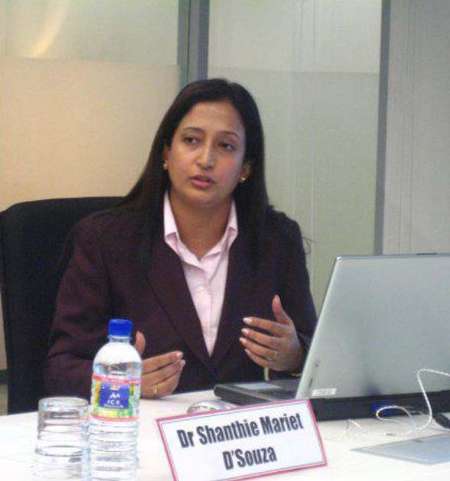
In an exclusive interview with IRNA here, the CEO and founder of the research forum Mantraya, Shanthie Mariet D’Suoza said, “Iran’s experience in dealing with issues of cross border terrorism and drug trafficking will be useful in the regional initiatives of counter-terrorism and counter-narcotic efforts. Greater trade, transit, transport and infrastructure connectivity with Iran could help the economies of Afghanistan and the Central Asian Republics of the Shanghai Cooperation Organization (SCO). Iran can play an important role in the economic stabilization of Afghanistan.”
On the SCO’s gain from Iran’s joining the organization and vice-versa, she said, “Iran like India and Pakistan, will stand to gain from the security and economic perspectives. The Shanghai Cooperation Organization (SCO) was originally formed as a confidence-building forum to demilitarize borders. It functions as a forum to strengthen confidence and neighborly relations among the member countries and to promote cooperation in politics, trade, economy, culture, education, energy and transportation. The SCO’s goals and agenda have since broadened.”
“It now includes increased military and counter-terrorism cooperation and intelligence sharing. One of the organization's primary objectives is promoting cooperation on security-related issues, namely to combat the 'three evils' of terrorism, separatism, and extremism. By joining the SCO, thus, Iran will be able to achieve its economic and security objectives. It will bind the conflicting countries in a mutually beneficial regional integration framework.” added D’Suoza who has authored a number of books on Afghanistan and the Central Asian Republics.
Elaborating on the objectives of the SCO, D’Suoza said, “The SCO has broadened its mandate in recent years to include joint security and economic development programmes. Intensified focus on regional economic initiatives like the integration of the China-led Silk Road Economic Belt and the Russia-led Eurasian Economic Union.
In 2014, China hosted the bloc's Peace Mission, its largest military exercise in terms of the number troops involved, more than seven thousand, and advanced weaponry deployed. Other organizational priorities are initiatives to deepen economic and energy cooperation, including establishing a bloc-wide development bank. Yet, much remains to be done.”
“The SCO could more effectively achieve its goals in Afghanistan if the organization helped develop that country’s legal economy and lowered trade barriers between the SCO members and Afghanistan. While certain barriers are for security reasons, the SCO could establish a small number of special border zones, with preferential custom and simplified visa regimes. They could also finance Afghan-led development projects and include Afghanistan in the infrastructure projects that they are building across the Central Asian landscape. These measures would help generate employment and economic opportunities for the youth in Afghanistan and Central Asian Republics that would help stem the tide of recruitment and extremism in the region,” said the former member of India’s top think tank “the Institute for Defence Studies & Analyses (IDSA), New Delhi
Expressing dissatisfaction over the achievement of the SCO, the distinguished expert of the security affairs said, “The achievements the SCO have been limited. The organization considers religious extremism, terrorism and drug trafficking as the potential serious threats to the region. It has not been able to deal with the growing threats of religious extremism due to the divided opinion of its members. So, despite of the presence of a common threat, there is no unified approach to dealing with the threat of extremism. Hence, the SCO has not been very effective in dealing with the threat.”
“The regional anti-terrorist structure (RATS) of SCO serves to promote cooperation of the member states against terrorism, separatism, and extremism, which it refers to as “the three evil forces.” The rationale for RATS was to tackle terrorism related problems that overspill into several of the SCO member states and thereby necessitate cooperative and coordinated mechanism.”
Expressing concern over the youth from the SCO member states joining the international terrorist groups, D’Suoza said, “Of late, Islamic State (IS) has recruited thousands of the SCO nationals. Citizens of the Central Asian states and Russia make up the third largest number of foreign fighters in IS. Even as the Islamic State weakens due to defeats on the battlefields, analysis of its activities shows that it has begun to change its recruitment tactics, particularly with regard to efforts targeted at Central Asia. And yet, the SCO’s response to the Islamic State remains weak and divided.”
264**1771
www.irna.ir
 solhkhabar | Peace International News Agency Peace International News Agency , Peace News , International Agency News of Peace
solhkhabar | Peace International News Agency Peace International News Agency , Peace News , International Agency News of Peace